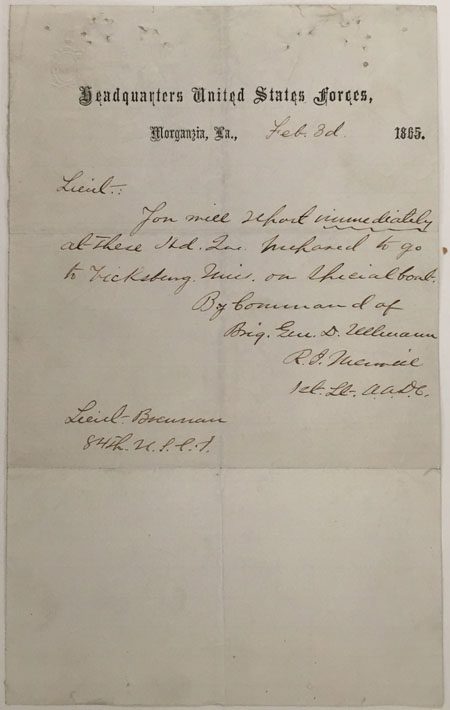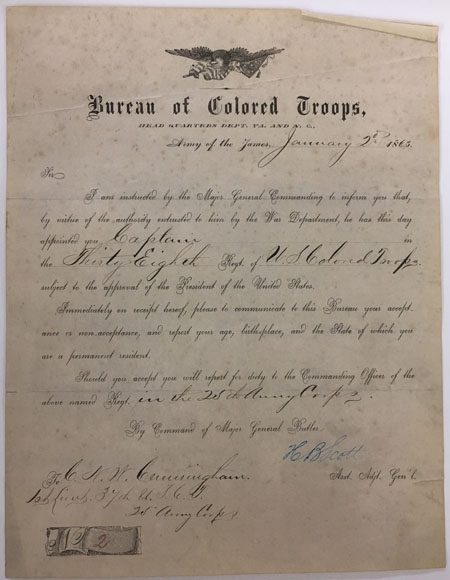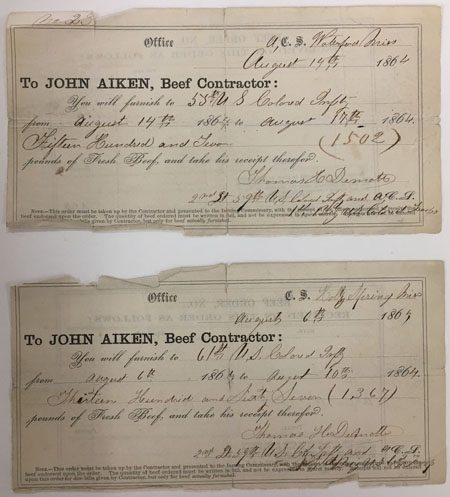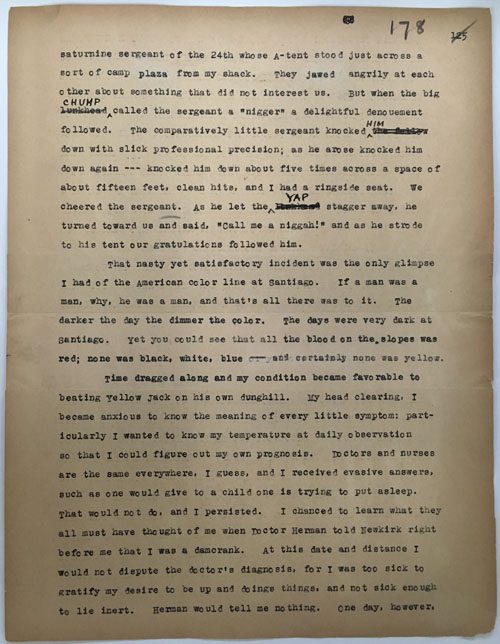To cap off Black History Month, CHM cataloging and metadata librarian Gretchen Neidhardt writes about her search for the voices of African American servicemen in our archives.
While in the process of digitizing the last of our paper card catalog for 6,000 small manuscript collections, I noticed that several items mentioned “Negro Troops.” (Our card catalog terminology needs updating, which is another step of the conversion process. Expect a future post on that.)
I pulled materials from four collections that were referenced. First was the papers of Sebastian Bauman Brennan, who was lieutenant of several black regiments during the Civil War, including the Chasseurs d’Afrique and the 84th Louisiana Colored Infantry. The collection includes his biography and several general orders Brennan wrote by hand.

An order Brennan received from Brigadier General D. Ullmann. All photographs by CHM staff
The Henry Bruce Scott papers consist of a single certificate from the Bureau of Colored Troops, Army of the James, composed of Union troops in Virginia and North Carolina during the final stage of the Civil War. Scott addressed the document to C. N. W. Cunningham, 1st Lieutenant of the 25th Army Corps.

The document informs Cunningham of his promotion from lieutenant to captain.
The Thomas H. De Motte papers include a letter from De Motte’s son, who was manager of the Chicago branch of the National Casket Company, and five contracts for beef for black regiments including the 55th US Colored Infantry, Batteries F and G, 2nd Regiment US Colored Light Artillery, 7th Regiment US Colored Heavy Artillery, and 61st US Colored Infantry. De Motte himself was 2nd Lieutenant, 59th US Colored Infantry.
 Two examples of beef contracts between the US Army and John Aiken.
Two examples of beef contracts between the US Army and John Aiken.
Lastly in our small manuscript search is an unpublished manuscript from John F. Kendrick, filed under “United States History. War of 1898.” His manuscript for Midsummer Picnic of ‘98 states that “This is the kind of doughboy memoir that arouses sympathetic reactions in many veterans of foreign service.” Kendrick discusses the black men with whom he served at length, in largely complimentary if simplistic terms. The whole work is filled with “spicy incidents that show that boys will be boys even in war.” It is a work begging to be published and annotated by a Spanish-American War historian, but is not a work full of African American voices.

Kendrick’s manuscript recalls an incident in which a black sergeant stands up to a bully. He remarks, “If a man was a man, why, he was a man, and that’s all there was to it.”
This was an unexpected trend throughout all these collections—even though all are about African Americans, none were actually by African Americans. There are a few reasons for this: African Americans are not always writing explicitly about being African American, so it wouldn’t necessarily get tagged in a subject; most of these documents are from commanding officers, and African Americans were often excluded from those positions; early collections acquired by the Museum (c. 1920 or earlier) make up the bulk of these small manuscripts and those collectors were not focused on African Americans or other voices of color.
Does this mean there is no representation of Black voices by Black voices in the small manuscripts collections? Of course not, but it does mean that more research is needed. There is an imbalance in the voices that were historically collected, but our current collection policies aim to emphasize those voices both in new acquisitions and emphasizing marginalized voices when we find them in the archives. And do not be dismayed—just because this initial search for black military service turned up less than I had hoped in the small manuscripts, materials might still be waiting there to be discovered by researchers like you.
We also have many collections with strong African American voices in other areas of the Museum, including our larger manuscript collections, prints and photographs, and published materials. Collections like the Claude Barnett papers and visual materials, Irene McCoy Gaines papers, Paul King papers, African American Police League records, Congress of Racial Equality records, and many more. I encourage you to explore our African American subject headings to see what you can find.